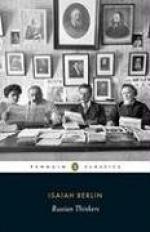|
This section contains 336 words (approx. 1 page at 400 words per page) |

|
In all these essays, Berlin makes little direct reference to the Communist revolution and its aftermath in the Soviet state, although he was writing from the 1940's to the 1970's. How do his essays, especially his main theme of tension between "monism" and "pluralism," relate to the Soviet reality of the time? How much knowledge does he assume in his audiences? (Remember, these essays appeared from the 1940's to the 1970's.)
How important is "religiosity" to the thinkers and writers discussed here? Would it be fair to say that a quest for religious commitment and certitude is an important element for all these thinkers, even the "secular" ones such as Herzen? Explain with examples.
Given only what you've learned from these essays, would you say Hegel's system was a "religion" or not? How did it influence its adherents? Support your answer from the essays...
|
This section contains 336 words (approx. 1 page at 400 words per page) |

|



